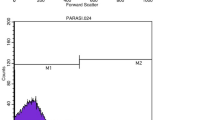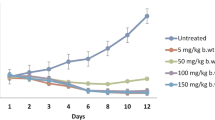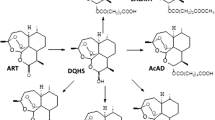Abstract
Four-week-old OF1 mice, infected with synchronized Plasmodium chabaudi chabaudi blood forms, were intraperitoneally injected with the naphthylisoquinoline alkaloid dioncophylline B (10 mg kg−1 day−1) at three consecutive days. The respective groups were treated when rings, trophozoites, and schizonts were predominant. Microscopical observations of thin blood smears were made every two hours after the start of the experiment. A clear dependency of the effectiveness of dioncophylline B treatments on the timing of drug administration was demonstrated. Based upon the evolution of total parasitaemia and the survival rates, it was concluded that ring stages are insensitive to dioncophylline B, while the drug is highly effective when given at the trophozoite stage and partially effective when given at the schizont stage. Dioncophylline B seems to act by inhibiting the haemozoin degradation, as indicated by pigment clumping, and by impairing the segmentation of schizonts.
Similar content being viewed by others
Author information
Authors and Affiliations
Additional information
Accepted: 15 March 1999
Rights and permissions
About this article
Cite this article
François, G., Chimanuka, B., Timperman, G. et al. Differential sensitivity of erythrocytic stages of the rodent malaria parasite Plasmodium chabaudi chabaudi to dioncophylline B, a highly active naphthylisoquinoline alkaloid. Parasitol Res 85, 935–941 (1999). https://doi.org/10.1007/s004360050661
Issue Date:
DOI: https://doi.org/10.1007/s004360050661




